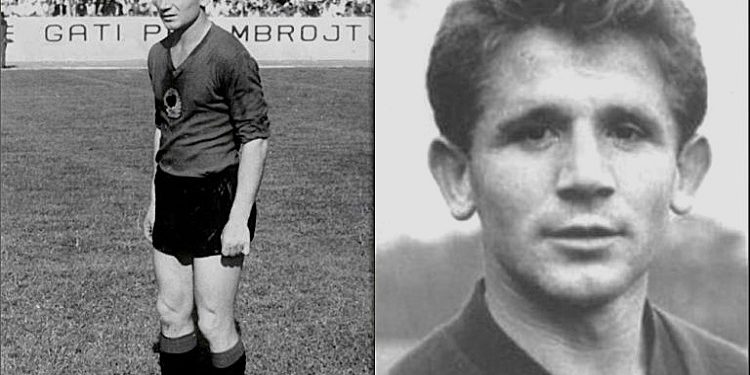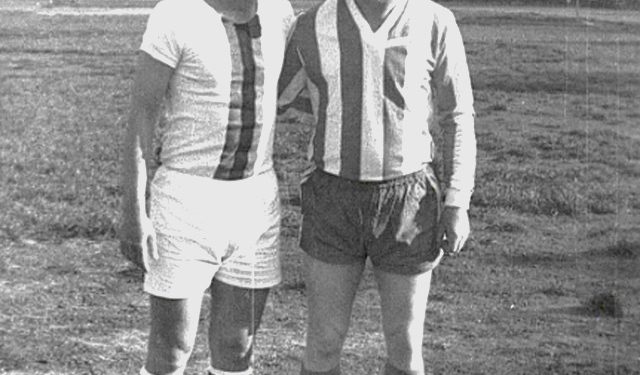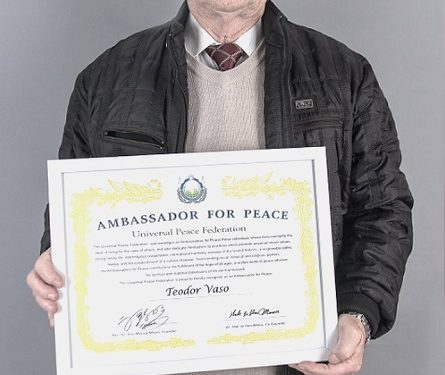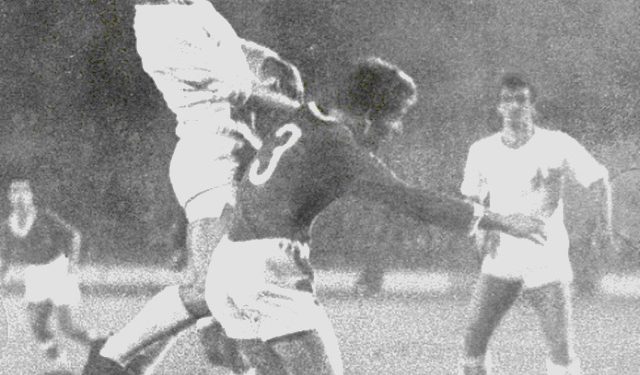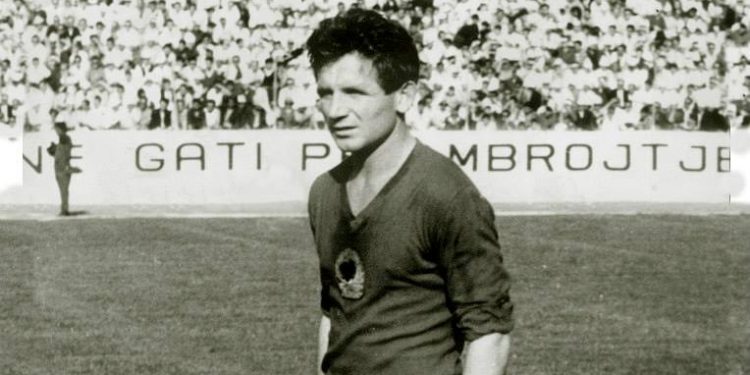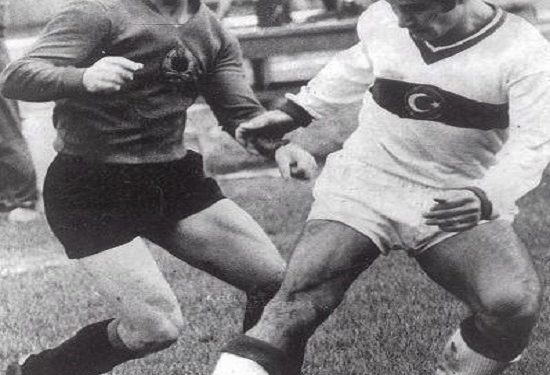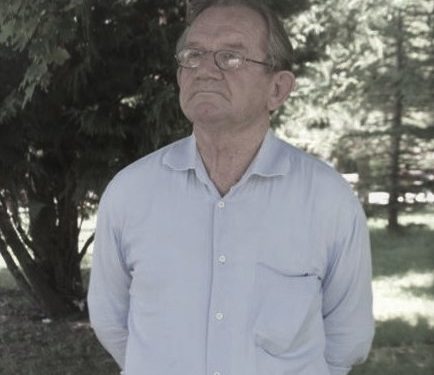Part Two
Memorie.al / Who wouldn’t want to return today to those years of the last century, to recall the impressive and historical panorama-memory, the distinguished elite of Albanian sports, those who made the history of Albanian football, the legendary footballers and heroes of their time, who, with intelligence, passion, talent, and professionalism, managed to write history at a national, European, and global level. Some of them rest in eternal peace, some of them are still there today – noble and proud, idols and legends; they are and will remain major figures, not only for the generation they belonged to and the future, but also for those dreamers, the young athletes, who wish to emulate those who made an epoch! Among them is the legend, the icon of Korça and Albanian football – the insurmountable – Teodor Vaso – a dominant sports figure in national and international matches, who gave fame and history to a more professional, spectacular, historical, and mythical football of the last century!
Continued from the previous issue
– Mr. Vaso, where did the strength of the success lie in the culminant phases of the “Skënderbeu” team against other teams, which gifted us the spectacular football of the ’70s?
Through the concepts of coach Ilia Shuke, who had left his post as a lecturer at the High Institute of Physical Culture in Tirana, the group of players comprising “Skënderbeu,” now more than ever in its history, included five players from the Albanian national football team: Todo Vaso, Koço Dinella, Aleko Pilika, Dhimitraq Dembo, and Dhimitraq Xhambazi. The public lived with its “Skënderbeu,” which had found itself and reached its peak, managing to achieve 29 consecutive matches without a single loss (victories and draws), including friendly preparatory matches. Suddenly, a phenomenon never before seen in Korça and other Albanian cities emerged, with the slogans: “Skënderbeu champion,” we want the “Balkan Cup.”
This era, which was called “the era of the new generation,” presented itself with confirmed values in results. In 1960, the Korça team was ranked fourth among 10 teams in the championship. In 1962, they drew 1-1 in Tirana with the champion team “Partizani” and 0-0 with “Dinamo,” while winning 3-1 against “17 Nëntori.” In 1963, they won 1-0 in Tirana against “Dinamo” of Tirana and won 1-0 in Korça against “Partizani.” In 1965, they reached the final of the Republic Cup against “Vllaznia” of Shkodra and were ranked second in the matches for the Cup among 32 Albanian teams. A year later, the “Ilia Shuke era” began, with two 0-0 draws against the two strongest teams of Tirana: “17 Nëntori” and “Partizani,” because “17 Nëntori” had by now “displaced” the great “Dinamo.” Korça won 2-0 in Vlorë, drew 0-0 in Kavajë, and drew 0-0 in Tirana with “Partizani” – all three in November 1966.
“Skënderbeu” won 4-0 in Elbasan (1967), 2-0 in Berat (1968), and in 1969 won 1-0 in Tirana against “Partizani” and 1-0 against “17 Nëntori,” while drawing 0-0 in Korça against Tirana. Victories and draws continued in Kavajë, Fier, 4-0 against Vlora, in Korça, and the results with the three Tirana teams were repeated. And then a climax came. On September 17, 1970, the formidable, majestic, fantastic “Ajax,” finalists of the 1974 World Championship with the Federal Republic of Germany, descended from Northern Europe to Tirana. “17 Nëntori” drew 2-2 with them. An impressive and dignified result.
Precisely, confronted with this product of a great team, two weeks later, the surprising and convincing values of another Albanian team, “Skënderbeu” of Korça, were evident, reflecting all the phenomena of modern football. They convincingly won 1-0 in Tirana against “17 Nëntori,” which had just achieved a historical brilliance in Albanian football. “17 Nëntori” not only drew with the great “Ajax” but was also the national champion in 1970. This period, which followed the brilliance of “Skënderbeu” the champion in the 1930s, was confirmed in the historical writings of the model sports publicist, Besnik Dizdari: “After the war, ‘Skënderbeu’ is the personification of Koço, G. Lara, P. Qirinxhiu, M. Ndini, S. Lubonja, Çela, Mile, M. Tuxhari, Prodani, Dvorani, Pilika, Raqi Pisku, who only fought to maintain a tradition. ‘Skënderbeu’ is of Todo Vaso, the legend of the Albanian National Team, the unforgettable stoic against the Germans; it is of A. Pilika, the center-forward, one of the most modern in Albania, the man who made Korça a challenger in ’77. ‘Skënderbeu’ is of Koço Dinella, the giant goalkeeper of Albania, but also of the unbending Dembo and Shule. ‘Skënderbeu’ is of Jani Kaçi, the most elegant goalkeeper in Albanian football. ‘Skënderbeu’ is of Dhimitraq Xhambazi and Milutin Kërçiç, the last modern players of Korça. ‘Skënderbeu’ is of Albania, the bright part of national football.”
– Prof. Vaso, you have been one of the best defenders in Albanian football, which gave you the chance to be a starter in the 11-man formation of our national team. What was the highest-quality match for you outside Albania, when, in what year, and where?
Classified sporting values are measured by figures in meters, kilograms, and seconds (after minutes or hundredths of a second). These have a testing ground for World Championships, Olympics, or continental competitions, etc. In sports games, they are measured in the aforementioned high-format competitions. There are two matches among many others. The first was the game in Belgrade on 12.11.1967, against the captain of the Yugoslav national team, the best left-winger in Europe at the time, Dragan Džajić, who was surprised by the block I made against him during the 90 minutes. In the presence of many Kosovar sports fans in the stadium and at the banquet after the match, he congratulated me on my excellent game and said: “You surprised me with your game, which I did not expect at all.”
The other game, which holds a special crowning achievement, was against the Turkish national team formation in Istanbul, on 13.12.1970. Some Turkish newspapers evaluated the players’ performance not with grades but with stars. One of them rated their player Metin from the Turkish team, and from the Albanian national team, Teodor Vaso, with the maximum rating of 4 STARS. I was presented with the newspaper and a photo against the Turkish footballer at the post-match banquet. But the greatest evaluation was given by the legendary coach of the Federal Republic of Germany, Helmut Schön, who, in the two matches – in Tirana against the FRG in 1967, and in 1971 – evaluated, among the Albanian players, only Panajot Pano and Todo Vaso, both times. These evaluations were published in the newspaper “Sporti Popullor” after the two matches.
– In 1972, in the presence of 50,000 spectators, the Albanian national team played at the “Mithat Pasha” stadium in Istanbul. The national team’s formation included two Korça footballers, Teodor Vaso and Koço Dinella. How did you, the Korça boys, manage to be part of this formation, when it was known that back then, the boys from the “Blloku” (The Block) played in the National Team’s starting eleven?
From 1945 until 1990, three Korça footballers wore the jersey of the Albanian National Team: the first – Teodor Vaso, the second – Koço Dinella, and the third – Jani Kaçi. However, A. Pilika, Dh. Dembo, G. Ibro were also activated in its formation, and with the national hopes team, Milutin Kërçiç, Dh. Xhambazi, G. Lici, P. Tole, G. Rrapo. All from working-class families. The two Korça boys who played in Istanbul were Todo Vaso and Koço Dinella. Dinella, the best of the match against “Ajax” in Holland at the end of September 1970, and Todo Vaso, the best with 4 stars at the end of 1970 [13.12.1970], against the Turkish national team. The Dutch press wrote about the “Ajax-17 Nëntori” match, specifically about Koço Dinella, exactly: “A small team (’17 Nëntori’) with a great goalkeeper.” The Turkish press evaluated the best players of the Turkey-Albania match: Metin [Turkish] and Vaso [Albanian] with 4 stars, as the best players of the match, with the maximum rating.
There was no football problem that allowed the children of the “Blloku” to usurp the national team jersey, but it was just as true that there was the issue of the influence of introducing players from the Albanian super-clubs, centered in Tirana, into the representative team. We must remember the truths. At that time, the class struggle mixed biographies, while today, in sports, truths are mixed. The children of that time could join any sports team without any obligation, whereas now, many talented children can never wear football boots or even approach a team because they cannot meet the financial obligations of training and match demands. It is a great sin!
– Which were the matches and meetings with high-ranking personalities that left the most lasting impressions on you? Did you happen to be criticized during your career?
They served another, past system. The small ones who act as if they are great, the great ones who blend with the small ones in behavior. He got out of the car alone, without guards, without fanfare, and waved to me. These exist throughout time. We were near the seaside in Durrës. As if we had known each other for a long time, he entered into conversation. Without prior notice, he waited there for our national team coach, Loro Boriçi, to arrive. We were training on the football field of the Military Officers’ Rest Home. We were going to play matches in Switzerland and Northern Ireland. Two years earlier, our national football team had suffered a 4-0 loss in Denmark; not far later, it lost 2-0 in Holland, and that same year, when we were supposed to play the two described matches, we lost 2-0 in Tirana to Holland and Switzerland. This record was a concern for the high leadership.
The high official naturally brought the conversation to our possibilities in the current football situation. So, I, as I imagined the situation, with a somewhat patriotic moral commitment, gave him an exposé of our possibilities. I took the opportunity and asked him: “Could he wait for one of my friends?” Above him were only Mehmet Shehu and Enver Hoxha; the biggest possibility to solve the problem. “I know your problem. You will only go abroad to the Eastern countries.” And we went there; both of us were with the “Partizani” team a year later. Another year passed, and the class struggle, which reignited again, cut off the path. Without his permission, I cannot mention his name. He is my friend; he is the best, my friend. My feelings do not concern whether I love or hate that man who was called Ramiz Alia. He spoke with my friend warmly, friendly, with respect.
Many may hate him, but the truth of that meeting is what I recount, without any exaggeration. He cordially greeted us and got into his “Benz,” as if he were traveling by taxi. The courier of the Executive Committee of the District left the order of the Chief of the General Staff, Petrit Dume, with my parents at my home: that “The reservist Todo Vaso will not go to the Bode match” [1968]. The next day, behind the door that knocked, I saw a young officer: “Comrade Vaso, General Petrit Dume is waiting for you at the Officers’ House!”
When he was descending the stairs of the second floor with a group of soldiers following him, his adjutant informed me in the Bar-buffet to go out into the hall. “Go to your duty,” he told all the present officers. After meeting me, we stepped out in front of the building, onto the sidewalk. “Has the trauma of the match with the Germans passed?” he asked me. “Yes, General!” “You will not go to the ‘Bode’ match, which has started, even if they notify you again. Have you become a Party member?” “No!” “We should have made you one when you were at our Sports Club.” After a few steps, we found ourselves face to face with the monument of Themistokli Gërmenji. He cast his gaze towards the fighter. “This region has produced many brave fighters.”
At that moment, I meditated; “I don’t know where he puts himself with the bravery shown for him.” “We fought against the Germans with weapons, you two, with Dinella, two Korça boys in that match, showed that even on the football field, Korça has great fighters. Goodbye.” Although I was a civilian, I don’t know why I saluted him militarily at that moment. They said that his deeds had been elevated high in the name of a legend, which is why many instinctively honored him militarily. At the end of September of that year, after the sensational victory against the great “Torino” of Italy in Tirana, he called me again and asked for my opinion: “Can we make changes in the formation for the match in Italy?”
“Excuse me, General, but you have a very specialized team staff?” “Yes, but I want to draw the opinion of technicians outside the staff, because there might also be familiarity with the local players. The French national team player, Combin, who did not play in Tirana, will also play there. The tall and solid player Gjergo Shule is suitable for that player as a stopper. Some football specialists have also suggested this to me. That boy should get ready, he should be prepared morally too,” said General Petrit Dume. Gjergo was surprised when I told him. His very good game showed that the contemplated variant was a correct solution.
During my long career, I have met and discussed with many personalities of that time: Ramiz Alia, Beqir Balluku, Petrit Dume, with Prime Minister Mehmet Shehu, Adil Çarçani, Mihallaq Ziçishti Deputy Minister of Internal Affairs, Pirro Kondi and Peti Shamblli, members of the Central Committee of the APL, Ramadan Xhangolli, First Secretary of the Party Committee, Korça, with Generals: Rahman Parllaku, Thoma Xhixho, Qazim Kapizyzi, Todi Naçi, Vaskë Gjino, Sejdi Avdija, Halim Xhelo, etc., and with other personalities of the Party and the power of the time.
I need to shed some light on a conversation with Deputy Prime Minister Beqir Balluku, because the event is synonymous with the event of my friend, the football legend Skënder Halili, a center-back of European dimensions (now deceased), whose career was massacred at its peak. Here is the similarity, but a completely fatal end for one of the two of us. We were going to play an extra match for the 1965-’66 champion title – “17 Nëntori” – “Partizani,” on June 12. Both teams ended the championship with 38 points each. Somewhat strangely, there, in the garden of the military officers’ rest home in Durrës. During the break hours, an officer whose face I only recognized approached: “Vaso, come, you are going to meet a Party comrade.”
On the second floor of the first two-story building, after the central one, when I entered inside, at the head of the room, I saw Beqir Balluku, dressed in civilian clothes with a white shirt. After two months, according to the new law, which had been in function for 2-3 years, I had to return to Korça to play with “Skënderbeu.” He inquired about my family situation and the living conditions of my people. After a conversation about football and international matches, Balluku sharply asked me: “Vaso, do you want to return to Korça, or do you want to play with ‘Partizani’?” – “I like both teams very much, but my wish is linked to continuing my studies, which can only be done in Tirana, for a normal career. I was a student with a high average.”
“You can stay with ‘Partizani’ if you are allowed by Korça, so you must talk to comrade Mihallaq Ziçishti.” Various delegations from the “Partizani” Sports Club, during the summer of 1966, returned empty-handed from a meeting with Ziçishti. Mihallaq Ziçishti, using the metaphor: “As long as the pistol that Enver Hoxha gave me is working, you, Vaso, will return to Korça!” That’s how he answered me when I told him that Beqir Balluku had sent me. And so it was! In September 1966, I returned to my hometown and wore the “Skënderbeu” jersey.
What about the synonymy with Skënder Halili’s event?!
Here is the event briefly: Skënder’s conversation happened a year before mine. It remained a blurred event. Before the start of the 1964-’65 championship, Skënder, who was released from military service (during which time he played with “Dinamo” of Tirana), was asked not to return to the “17 Nëntori” team, but to stay with “Dinamo,” declaring that it was his will. Taken to high state levels, this so-called agreement turned into a scandal, because when he was expected to appear in the first match in the “Dinamo” jersey, he was seen wearing the “17 Nëntori” jersey.
“Dinamo” did not “forgive” this “betrayal,” and an ordinary mistake was found, which sent Skënder Halili to prison, thereby definitively imprisoning his football career. You asked me if I happened to be criticized during my sports career?! In the context of this question, I will recount the only criticism in hypothetical form: “The day before yesterday, we did not see the usual Vaso, so energetic and confident,” was written in the newspaper “Sporti Popullor” [16.05.1967], for the Albania – Yugoslavia match in Tirana, which we lost 0-2.
My career has two severe and strange events, which many have called absurd. In the 1973 – 74 championship, after a football match, a large group of sports fans protested in front of the central tribune for a bad refereeing of the match. With the exception of bombastic shouts and words, there were no destructive actions. Suddenly, late in the evening, I was called to the investigation office, in a room with four or five agents, where they threatened me: “…You are disturbing the order and inspiring the masses of fans for hooligan actions. We will cut off your balls to show you who you are! Go now and this conversation remains here between us, or else…”!
In truth, it made no sense why there should be talk about what they were alluding to. But, the Secretary of the Party Committee, Enver Halili, who at that time in Korça created the opinion that he solved problems, guided by tolerance and help, told me: “Vaso, I also finished the Faculty of Law; the investigation office calls people to get information about anti-legal issues. I am a Party member and according to the laws, they must expel me from the party to call me to the investigation office. I will solve this problem,” and he closed the conversation. And it was closed, but I knew the source from which the orientation had come; the investigation office was only carrying out the order.
In order not to be seen as a challenge, not immediately, but after a few months, I asked for my resignation, which Enver Halili accepted, and in public opinion, it seemed as if Coach Teodor Vaso was dismissed from his duty. This event became known when, after the change of the system in 1990, I recounted it in conversations with my friends. I wrote about this event in the newspaper “Koha Jonë” in 1994, authored by journalist Pandi Konçi. The second event became publicly known in the 1996-’97 school year, in front of the collective of teachers of the “Stavri Themeli” school. The General Secretary of the Albanian Football Federation (FSHF) in the years 1990-1997, now Director of International Relations in the Spanish Football Federation, Mr. Eduard Dervishi, told me at a football seminar in Tirana: “My superiors asked what Todo Vaso had done to be fired, if he had killed someone?!”
The distinguished volleyball player Pirro Demiri handed in my membership card to the Trade Union, because no other teacher protested or asked for the reasons for the dismissal. Together with my wife, we went through a very difficult year, because she was also fired from her job since the factory where she worked was privatized. I now receive a curtailed pension. The intervention of the central education bodies was needed for me to return to work at the “Themistokli Gërmenji” gymnasium. This absurd event was not the engagement of the state of that time, or the Democratic Party, but of specific individuals who acted by weaving intrigues and absurd militant punishments. Many do not even believe it, but in the end, the event and its consequences have been consumed and remain as historical events. / Memorie.al




